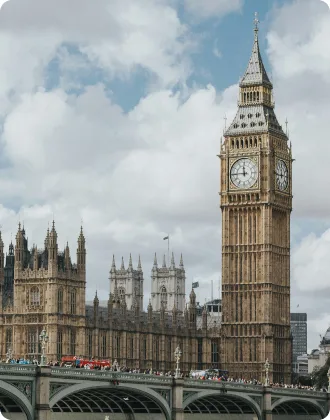
Forex license in UK
Holders of UK Forex License have the opportunity to operate in one of the most promising jurisdictions. The UK has a flexible, but strict regulation of forex activities, which favorably affects both business development and the reputation of the company. Gofaizen & Sherle specializes in licensing and can offer services to obtain a license remotely and in a short period.
The UK is one of the leading countries in the world in terms of prestigious forex licensing, representing the gold standard for brokers seeking international recognition. Among brokers and investors, the UK Forex Brokerage License is considered not only a mark of quality but also of trust, opening up new horizons of opportunities for holders in the global arena. Obtaining such a license is not easy, requiring time, resources, and strict compliance with high regulatory standards.
The UK attracts brokers not only for its economic stability and reputation but also for its ability to provide services to the entire European market, thanks to one of the most developed financial sectors in the world. Requirements for obtaining a license include the need to have sufficient initial capital, a registered office in the jurisdiction, and qualified management able to prove their professional suitability.
A key aspect of obtaining a license is demonstrating full compliance with FCA standards, which cover risk management, protection of client funds, transparency of operations, and broker integrity. The process of obtaining a license requires a thorough understanding of local legislation and a willingness to be scrutinized by the regulator.

Advantages of the UK Forex License
Global reach
Obtaining a license opens up the possibility for brokers to offer their services worldwide, extending their reach to the European and global markets. This allows them to attract clients from different countries, significantly increasing their potential client base.
Online trading without borders
Access to online trading is a key aspect of today’s financial world, and a license ensures brokers can legally provide trading services over the Internet. This allows clients to transact in the financial markets at any time and from anywhere in the world.
Prestige and reliability
Jurisdictions with a license have a high reputation for reliability and economic benefits. This inspires confidence in entrepreneurs and clients, confirming the safety and stability of financial transactions within the jurisdiction.
Simplicity of identification
Licensing includes the development of simple and clear identification procedures to ensure efficient and secure interaction between brokers and their clients. This helps to build trust and protect the interests of all parties.
Efficiency of the licensing process
The licensing process is fast and efficient, provided that all requirements and standards are strictly adhered to. This allows brokers to quickly begin legitimate activities, minimizing time costs and bureaucratic delays.
Convenience of renewal and cost-effectiveness
The licensing system provides for easy license renewal procedures, as well as a relatively low cost of maintaining licenses. This makes the process not only less costly but also ensures a long-term perspective for brokerage activities in the jurisdiction.
Request more information about Forex License in the UK
Requirements for obtaining the UK Forex License
When applying for a Forex license in the United Kingdom, applicants must meet certain requirements and demonstrate their compliance with several critical conditions and standards. Failure to meet at least one of these criteria may result in the denial of a license. Key requirements include:
- Legal presence and management
The company must be registered in a UK jurisdiction and have a registered office. An important condition is the presence of a local director, who must have the necessary experience and competencies, confirmed by the regulator through special tests and procedures.
- Financial conditions
Different license types have their minimum capital requirements: from 50000€ for a limited broker license to 730000€ for a market maker license. Each candidate must provide detailed financial statements and an assessment of the company’s financial position.
- Documentary evidence
The required application package includes a formal application, primary information about the applicant and the company, details of key individuals, a five-year business strategy, a description of the organizational structure, and financial statements.
- Personnel and physical presence
The company must establish a ‘reasonable and supervised’ presence in the UK, which includes the appointment of a compliance officer and CEO based in the country, vetted and approved by the regulator.
- Personnel qualifications
A key factor in a successful application is the availability of qualified people who form the backbone of the company. Not only must they be highly qualified, but they must also be approved by the regulator.
Additional requirements:
- Development of a business and financial plan
- Establishment of compliance and anti-money laundering (AML) and counter-terrorist financing (CTF) procedures
- Verifying compliance with customer knowledge (KYC) requirements for beneficial owners, directors, managers, and divisions
- Organization of confirmation of professional indemnity insurance
Process and timeline for obtaining a Forex License in the UK
The process of obtaining a Forex Broker License in the United Kingdom to conduct business is a key step for companies seeking to operate legally and transparently internationally. To go through this process successfully and efficiently, you need to prepare thoroughly and follow a sequence of steps:
Company Registration
Step 1
- It is necessary to organize the registration of a local company, a process that (if all conditions are met) takes up to four days. This is the first and most important step to confirm your legal presence and intention to do business in the jurisdiction.
Preparing the documentation
Step 2
- The next step is to collect the necessary package of documents, including the application and forms approved by the regulator, as well as the development of a business plan, a description of the company structure, financial statements, and an assessment of the financial position.
Forming the team
Step 3
- It is important to ensure that qualified management and compliance personnel are hired. The team must be prepared to effectively manage the company and meet the requirements of the regulator.
Opening a bank account
Step 4
- A corporate bank account should be opened to run the business and deposit the initial capital.
Deposit the initial capital
Step 5
- Once the account is opened, the full amount of the initial capital, as determined by the regulator’s requirements, must be deposited into the account.
Waiting for the regulator’s decision
Step 6
- After submitting all the documents and fulfilling the requirements, you should wait for a response from the regulator. This process may take some time, depending on the efficiency of processing your application.
Obtaining a license
Step 7
- The final step is to obtain a UK Forex License, which certifies your right to conduct your business by the law and regulatory requirements. Obtaining a license opens the door for your company to the international market and confirms its reliability.
Open a Forex Company in the UK
To start a forex business in the UK, the first thing you need to do is to register your company. This can be done online, which is the quickest way to do it. If all the information provided during the application is correct and there are no comments, the issuance of the registration certificate can take place within a few working days. The limited liability company (Ltd) format is often chosen for forex firms because of its advantages in terms of protecting shareholder liability and ease of attracting investment.
The basic requirements are:
- A minimum of one shareholder;
- Appointment of a minimum of one director who may be the same as the shareholder;
- Appointment of an anti-money laundering reporting officer (MLRO);
- Identification of a registered office address within the UK for the registered office;
- Opening a corporate account.
Procedure for starting a forex business:
- Approve a unique and legitimate name for your company.
- Rent or purchase a local office in the UK.
- Prepare all required documents, including their official translations.
- Identify the director and key employees.
- Send the documents to Companies House for registration and pay a registration fee of about 12 euros.
- Open a corporate account.
- Submit documents to obtain a license from the FCA regulator.
- Register the company with HMRC for corporation tax.
- If required, register for value-added tax.
The required documentation package when registering a company should include:
- Articles of Association;
- Details of share capital;
- Consent to the appointment of directors;
- Statement of compliance with detailed information about the company;
- Information on persons with meaningful influence over the management;
- Receipts for financial receipts;
- Proof of payment of the registration fee;
- Copies of certifying documents of shareholders and directors, proof of their addresses.
How to Apply for a Forex License in the UK
To apply for a UK Forex Brokerage License, follow these steps for an efficient and structured process:
- Gather the required documents.
- Pay the application fee.
- Register with the FCA (Financial Conduct Authority), and apply online along with the application package.
- await FCA review. The regulator will assess your application, checking compliance and information with other regulators.
- Be prepared for possible additional requests for information, documentation, or face-to-face interviews during the assessment.
It will take approximately 6-12 months to process the application. Successfully obtaining a license will allow you to operate, with the requirement to maintain compliance with FCA regulations. Failure to comply may result in fines or license revocation.
Types of forex licenses in the UK
The UK offers forex companies a variety of licenses tailored to the specifics of their business. It is important to carefully select the type of license that best suits the company’s operational objectives and strategy.
Types of Forex licenses in the UK:
1. Proprietary trading license (Market Maker).
Designed for companies that trade on their account.
- Diversity of revenue streams through spreads and market operations.
- Enhanced reputation and market position of the company.
- Increased control over the risks of trading operations.
2. Model Agency License (STP).
Used by brokers operating on a direct trade processing model, linking client orders to vendor liquidity.
- Growth of the client base due to transparency and honesty in the execution of transactions.
- Increased client confidence due to the absence of conflicts of interest.
- Access to a wide range of liquidity providers providing competitive spreads.
3. Limited broker license.
Designed for companies focused on marketing and soliciting clients for other brokers without managing client funds.
- Specializing in marketing and promotion without having to manage client finances.
- Creating partnerships with licensed brokers, and expanding service offerings.
- Opportunity to receive referral commissions that expand revenue opportunities.
Choosing the right type of license depends on many factors, including the business model, target audience, and strategic goals of the company. Consulting with Gofaizen & Sherle attorneys can help determine the best option and ensure that all requirements are met to successfully obtain a license.

Find out more about the UK Forex license
Forex Lawyers in the UK

Position
Senior Associate, Business Development Manager (FX & iGaming)Phone
+372 5477 0344
Position
Senior Associate, Head of Sales (FX and iGaming)Phone
+372 5300 1858Regulation of the UK Forex License
The Financial Conduct Authority (FCA) is the main regulator of the forex market in the UK, playing a central role in maintaining the stability and integrity of financial transactions. The FCA oversees the activities of nearly 45,000 businesses, aiming to ensure that financial markets work in the interests of both individuals and businesses while contributing to the growth of the country’s economy.
The FCA aims to ensure that financial markets operate fairly and transparently, which is critical to protecting consumers, maintaining confidence in the financial system, and encouraging healthy competition. The regulator sets high standards of behavior for financial services firms and actively works to prevent financial risks and unfair practices.
Since its establishment on April 1, 2013, the FCA has taken over the conduct regulation and prudential supervision tasks previously assigned to the Financial Services Authority.
The regulator is governed by the Financial Services and Markets Act 2000 (FSMA) and is subject to oversight by the UK Treasury and Parliament. The Act also has a significant impact on forex companies by establishing a framework for the regulation and supervision of their activities. It has several key aspects that affect the operations of forex companies:
- FSMA requires all forex companies to obtain a license from the Financial Conduct Authority (FCA) before they can begin operations. This ensures that companies meet certain standards and can offer their services to clients in the UK.
- The Act sets out standards of conduct and prudential requirements for forex companies, including anti-money laundering (AML) rules, protection of client funds, integrity and transparency of offerings. Forex companies must develop and implement policies and procedures to comply with these standards.
- FSMA strengthens the protection of forex companies’ customers by requiring forex companies to provide clear, complete, and non-misleading information about their products and services. Companies are also required to handle customer complaints fairly and promptly.
- The FCA, acting under powers granted by FSMA, carries out regular supervision of forex firms, including audits, reviews, and assessments of their financial condition and risk management practices. This ensures that firms comply with the requirements and regulations set out.
- In the event of a breach of the law, the FCA has the power to take enforcement action against forex companies, including imposing fines, suspending or revoking licenses, and initiating criminal prosecutions for serious violations.
In addition, the following legislation applies to forex firms:
- Market Abuse Regulation (MAR): Aimed at preventing market abuse, such as manipulation and insider trading, to maintain the integrity of the financial markets.
- Sanctions and Anti-Money Laundering Act 2018: Introduces identification and verification procedures to combat money laundering and terrorist financing.
- Terrorism Act 2000: Sets out a framework for countering terrorism, including measures on the financing and support of terrorist activities.
- Anti-Terrorism, Crime, and Security Act 2001: Extends powers to tackle terrorism and crime, including through financial restrictions.
- Anti-Terrorism Act 2008: Introduces additional measures to prevent terrorism, including bans on terrorist literature and material.
- Proceeds of Crime Act 2002: Defines measures for the confiscation of proceeds of crime, including provisions relating to money laundering.
These laws and regulations provide a comprehensive legal framework to ensure that forex companies operate within a legal framework designed to protect the market, investors, and public safety.
Taxation for Forex companies in the UK
The taxation of forex trading in the UK depends on the financial instrument you choose. The two main instruments are spread betting and contracts for difference (CFDs), each of which is subject to a different tax regime.
- Spread bets in the UK are generally exempt from capital gains tax (CGT). This means that profits made from trading spread bets are not taxed.
- Profits from trading CFDs may be subject to capital gains tax. Tax rates depend on the taxpayer’s total income: the basic rate is 10%, while the rate increases to 20% for taxpayers in a higher tax threshold.
For those who consider forex trading as an additional source of income, the first £1,000 of profits are exempt from tax.
Corporation tax and VAT
- Forex companies in the UK are subject to corporation tax at a rate of 17%.
- The standard VAT rate is 20%, which is also important to consider when organizing and running a forex business.
It is important to note that tax legislation is subject to change. We recommend that you consult with a tax advisor for up-to-date information and to optimize your tax liabilities.

FAQ about the Forex License in the UK
Is forex trading Legal in the UK?
Yes, forex trading is legal in the UK and is regulated by the Financial Conduct Authority (FCA), ensuring transparency and investor protection.
How to obtain a Forex Broker License for the UK?
To obtain a UK Forex License, you need to register a company, prepare the necessary documents, form a management team, open a bank account, and deposit initial capital. After submitting the documents to the FCA, you should wait for the regulator’s decision. Obtaining a license confirms the right to conduct business and opens access to the international market.
What forex brokers are regulated in the UK?
In the UK, forex brokers are regulated by the Financial Conduct Authority (FCA) to ensure they meet strict financial and operational standards.
How much does it cost to get a Forex license in the UK?
The cost to obtain a Forex Broker License in the United Kingdom can vary depending on several factors, including the type of license, the size and complexity of your business, and the need for additional consulting or legal services.
How long does it take to obtain a UK Forex License?
Obtaining a Forex license in the United Kingdom takes from 6 to 12 months. The timeframe may vary depending on the quality of the application the specifics of the business, fulfillment of requirements. To speed up the process, it is important to prepare all necessary documentation accurately and completely.
How do I start a forex trading company in the UK?
To start a company it is necessary to register it as a Ltd, identify at least one shareholder and director, establish a registered office in the UK, open a corporate account, register with Companies House, and apply for an FCA license.
Connect with our experts
Our experts will tell you how to do it as quickly and easily as possible.
By clicking the button, I confirm that I have read the privacy policy and consent to the collection and processing of my personal data in accordance with the GDPR rules.
to our news & insights